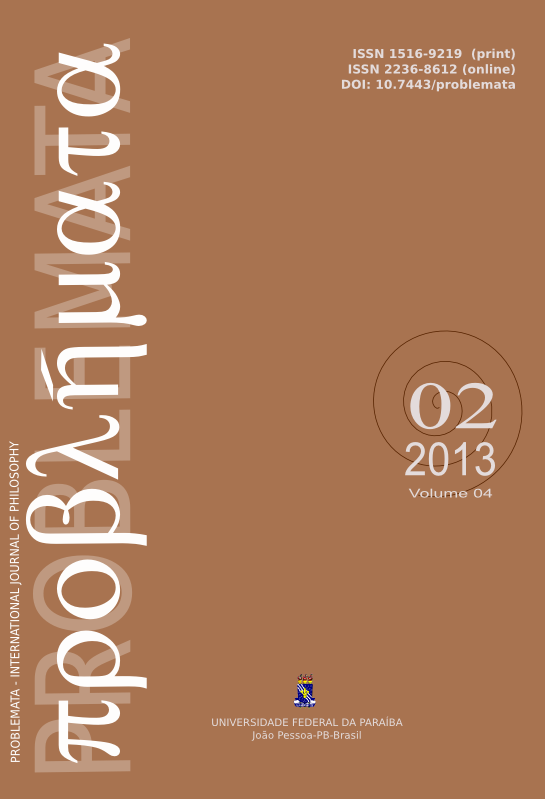Heidegger e a questão do sujeito: indícios para um filosofar sem imagens
DOI:
https://doi.org/10.7443/problemata.v4i2.15454Keywords:
Heidegger, Hermenêutica, Crítica do sujeitoAbstract
O artigo procura elucidar a crítica do sujeito sustentada por Heidegger em diferentes momentos de sua produção intelectual. Nesses termos, é sua pretensão aprofundar o debate em torno daquilo que nos acomete em nosso social atual, reconhecendo os impasses que uma filosofia afeita ao domínio irrestrito da representação foi capaz de produzir. Em suma, o artigo vislumbra, a partir da leitura radical que Heidegger realizara em torno dessa questão, uma saída possível para o mal-estar hodierno, na medida em que aponta para a possibilidade de um filosofar sem imagens. O distanciamento da lógica binária que esse pensamento se propõe a partir do uso operativo do constructo ser-no-mundo, viabilizaria, pois, a conquista de um horizonte hermenêutico solícito ao detalhe de nossa condição humana, marcado que é pelo traço da diferença ontológica.
Downloads
References
DUFOUR, D-R. Os mistérios da trindade. Rio de Janeiro: Companhia de Freud, 2000.
_______. A arte de reduzir as cabeças: sobre a nova servidão na sociedade ultraliberal. Rio de Janeiro: Companhia de Freud, 2005.
GADAMER, H-G. Warheit und Methode, Grundzüge einer philosophischen Hermeneutik. Tübinge: J. C. B. Mohr, 1986.
HEIDEGGER, M. Sein und Zeit [SZ] (1927). Frankfurt am Main: V. Klostermann, 1977.
______. Prolegomena zur Geschichte Zeitbegriffs (Sommersemester 1925). Frankfurt am Main: V. Klostermann, 1979.
______. Die Grundbegriffe der Metaphysik: Welt, Endlichkeit, Einsamkeit (Wintersemester 1929-1930). Frankfurt am Main: V. Klostermann, 1983.
______. Holzwege [HW] (1935-1946). Frankfurt am Main: V. Klostermann, 1984.
______. Ontologie. (Hermeneutik der Faktizität) (Sommersemester 1923). Frankfurt am Main: V. Klostermann, 1988.
______. Einführung in die Phänomenologie der Religion. In: Phänomenologie des religiösen Lebens. (Wintersemester 1920-1921). Frankfurt am Main: V. Klostermann, 1995.
______. Einleitung in die Philosophie (Wintersemester 1928/29). Frankfurt am Main: V. Klostermann, 1996.
______. Nietzsche II [N II] (1939-1946). Frankfurt am Main: V. Klostermann, 1997.
______. Logik als die Frage nach dem Wesen der Sprache (Sommersemester 1934). Frankfurt am Main: V. Klostermann, 1998.
______. Sein und Wahrheit. 1. Die Grundfrage der Philosophie (Sommersemester 1933). 2. Vom Wesen der Wahrheit (Wintersemester 1933-1934). Frankfurt am Main: V.Klostermann, 2001.
______. Interpretaciones Fenomenológicas sobre Aristóteles (indicación de la situación hermenêutica) [Informe Natorp]. Madrid: Trotta, 2002.
LEBRUN, J-P. Um mundo sem limite: ensaio para uma clínica psicanalítica do social. Rio de Janeiro: Companhia de Freud, 2004.
MAUSS, M. Sociologia e antropologia. São Paulo: Cosac Naify, 2003.
PLATÃO. O Sofista. In: Diálogos I. Tradução de Edson Bini. Bauru: Edipro, 2007.
RICOEUR, P. O conflito das interpretações: ensaios de hermenêutica. Porto: Rés, [s. d.].
RORTY, R. Philosophy and the Mirror of Nature. New Jersy: Princenton University Press, 1980.
STEIN, E. Diferença e metafísica: ensaio sobre a desconstrução. Porto Alegre: Edipucrs, 2000.
______. Nas proximidades da antropologia: ensaios e conferências filosóficas. Ijuí: Unijuí, 2003.
Downloads
Published
Issue
Section
License
Authors who publish with this journal agree to the following terms:
- Authors retain copyright and grant the journal right of first publication with the work simultaneously licensed under a Creative Commons Attribution License that allows others to share the work with an acknowledgement of the work's authorship and initial publication in this journal.
- Authors are able to enter into separate, additional contractual arrangements for the non-exclusive distribution of the journal's published version of the work (e.g., post it to an institutional repository or publish it in a book), with an acknowledgement of its initial publication in this journal.
-
- Authors are permitted and encouraged to post their work online (e.g., in institutional repositories or on their website) prior to and during the submission process, as it can lead to productive exchanges, as well as earlier and greater citation of published work (See The Effect of Open Access).





